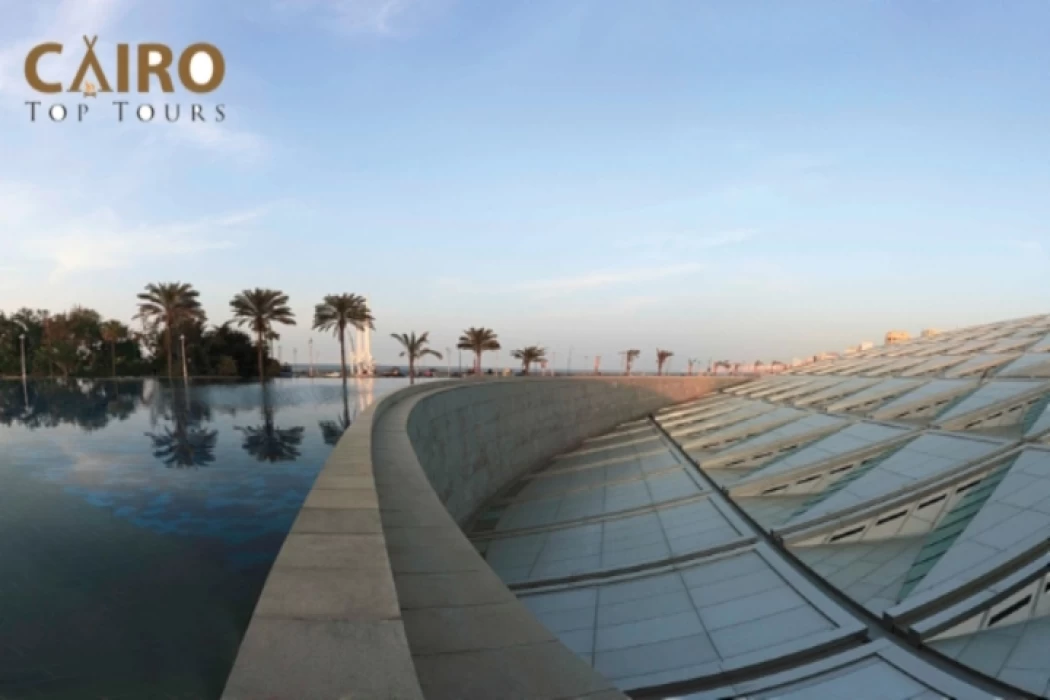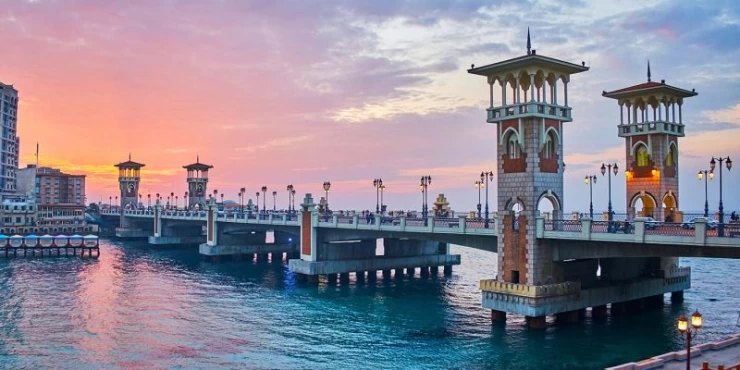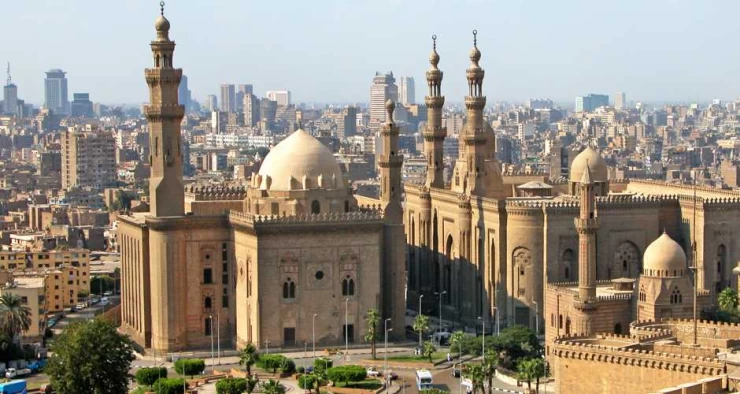
bibliotheca Alexandrina

Bibliotheca Alexandrina
The Library of Alexandria was the world's largest library it was established by King Ptolemy I and it housed about 900,000 manuscripts throughout his reign.
Alexandria Library (Bibliotheca of Alexandria)
The original library had all the article's secrets regarding the traditional civilization of Egypt.
Library of Alexandria
Its destruction has been attributed to totally different actors, however, no version has been tried, the sole clear issue is that it finally disappeared, and it was not till 1987 that a world project wanted to rescue the cultural significance of the location and therefore the image it represents, began the legendary collective imagined library of humanity. UNESCO coordinated the project and eventually, the name the Alexandria Library, it was formally opened in 1996.
As well to its massive archive, which can withstand carrying about twenty million copies, and a space for over 2,000 simultaneous scholars, it also has a planetarium, and a Science Museum, one for calligraphy and the other one for archaeology, in addition to a laboratory of restoration, a modern printing press and a library specialized for children and people with special abilities.
Discover the Bibliotheca of Alexandria and many other monuments in the city that was built by the legendary Macedonian ruler Alexander the Great in 332 B.C. by booking the traditional day tour to Alexandria from Cairo to enjoy the best atmosphere in the whole country of Egypt.
Exploring the Treasures of the Bibliotheca Alexandrina: A Contemporary Wonder in Alexandria.
Sitting on the shores of the Mediterranean Sea in Alexandria, the Bibliotheca Alexandrina is a stunning monument to one of the most famous primal libraries. The New Library of Alexandria is designed in modern architectural design, houses an incomprehensible variety of materials, and utilizes the latest available technological advancements; thus, the New Library of Alexandria has become a beacon of information and heritage for researchers and tourists alike. In this article, we investigate the exceptional history and remarkable achievements of Bibliotheca Alexandrina, including its establishment, architectural design, collections, and contribution to education and intercultural communication today.
The Vision Behind Bibliotheca Alexandrina
The Library of Alexandria, which first came into existence around the 3rd century before the Common Era, was an ancient library in the world that was massive and of great geographical significance. It captured the brainpower of Alexandria in that scholars and learned men and women from every part of the globe trooped in to learn, converse, and even teach. Even though the old library was unfortunately burned down to ashes, its memory has been able to motivate the entire world positively.
In the late 20th century, Egypt was involved in far-reaching activities to undertake this effort, with the help of UNESCO and several countries around the world. The purpose was to create a modern library that would also incorporate an area for educational and communal interactions rather than a boring storage place for books. This she envisaged for completion in the year 2002 with the formal launch of the Bibliotheca Alexandrina, a newly built facility located in proximity to the ancient library of Alexandria.
Architectural Brilliance: A Design Symbolizing the Sun
The edifice, whose creation was by the Norwegian architecture firm Snøhetta, has quite interesting traditional and modern architecture. The building structure of Bibliotheca Alexandrina, takes the form of a huge blunt disk at an angle, symbolizing the sun of knowledge, which brings light to Alexandria and other places. The design is well thought out to retain the historical, cultural, traditional, and ethnic values of Egypt in building a modern center.
One of the most notable elements of the library is the granite wall that surrounds the building and has engravings in 120 languages illustrating the people's linguistic richness. This very well represents the ideals of the library, which is to become a place for everyone everywhere, a true learning and inclusive center. Another characteristic feature of the construction is its sloping roof, which enables the penetration of sunlight in the interior, providing a calm and pleasant ambiance conducive to reading, working, or admiring the structure.
A Vast Collection and Cultural Treasures
The Bibliotheca Alexandrina has a vast repository of more than 2 million books, which comprises rare books, old letters, and many modern-day publications in other languages with an array of topics. The collections are made up of various libraries that focus on specific issues, e.g., some of them in their highlights include: The Reading Hall: This is an enormous multi-stepped-up space that can seat more than 2000 readers, which makes it second to none in huge sizes of reading spaces across the globe. This space is intended to be free of restrictions and encourages interaction where participants can calmly read or reference materials while studying.
Manuscript Museum: This museum houses rare texts and manuscripts, many of which were produced hundreds of years ago, giving tourists a chance to interact with valued historical works. The museum also provides reproductions of these artifacts in digital formats to ensure that these reserves do not deteriorate when used in research.
Taha Hussein Library for the Blind and Visually Impaired: Named after the famous Egyptian scholar, this library has certain resources and facilities available especially to those who are visually impaired, including Braille books and device reading software.
Children’s and Young People’s Libraries: These are sections aimed at encouraging reading among children. The library seeks to reach out to children and arouse their thirst for knowledge and readiness to create by organizing diverse activities such as workshops, storytelling, and other fun activities.
Digital Library: This is one of the modern features of the Bibliotheca Alexandrina, and this part aims at causing the processes of books, manuscripts, and other historical materials, in this way making them available to many researchers around the world and also ensuring that the heritage of Alexandria is kept for the coming generations.
Science and Cultural Museums: A Journey Through Knowledge
The Bibliotheca Alexandrina is more than merely a library; it is an intricate cultural center. Its design thus incorporates multiple museums and galleries of scientific, historical, and artistic significance.
Antiquities Museum of the Bibliotheca Alexandrina: This is inside the library. It exhibits several objects and things relating chiefly to the three periods of Egypt and, more importantly, her presence in Pharaonic and Alexandrian Greek-Roman histories. A few highlights include items that were brought back from divers deep in the Mediterranean, where Alexandria used to be.
Museum of the History of Science: This museum is dedicated to the scientists and inventors from Egypt and focuses on the Egyptian influence in fields such as math, astronomy, and medicine.
Planetarium Science Centre: The planetarium unlocks the magic of skills such as astronomy and physics and, at the same time, offers visitors the opportunity to actively participate. Its dome theater has a space and science theater for both kids and grownups, making the place a great learning experience.
Art Galleries: Art exhibitions at the Bibliotheca Alexandrina are held from time to time, displaying both modern and ancient artwork. Most of these galleries concentrate on work by Egyptian artists but also include artists from other countries, celebrating and encouraging harmony and interaction among cultures.
Promoting knowledge exchange and cultural dialogues
The Alexandria Library is an institution committed to fostering intercultural interactions through the hosting of several conferences, workshops, and cultural programs. These activities are held throughout the year, featuring participants such as experts, artists, and other scholars from various parts of the world. A few of these activities are as follows:
Annual Book Fairs: Bearing in mind the vision of the Library of Alexandria, which is to make people read very widely, the Library of Alexandria hosts once-a-year book fairs, which draw publishers and readers from Egypt and beyond. This serves as a platform for readers to interact with and buy many different kinds of literature, including academic books and the popular ‘to read’ titles.
International Conferences: Bibliotheca Alexandrina no longer has become a core address for the international discussions of various subjects such as science and technology, social issues, the humanities, and many more. It organizes important events in the form of conferences and seminars where two or more sides meet and share their ideas and visions.
Workshops and public lectures: The library regularly conducts and invites all comers to different subjects’ workshops and public lectures; thus, there are educational sights for any age group. This type of session gives an opportunity for the guests of the library to learn more about such areas as art, literature, science, and technology.
Bibliotheca Alexandrina's Role in the Digital Age
The COVID pandemic has propelled the world into a situation where almost everything is done online, including education and research. The Bibliotheca Alexandrina has not been left behind. It has several digital projects, including the Digital Assets Repository and Internet Archive, from which researchers and the general public can access a wealth of materials without physically visiting the library. Furthermore, it provides e-learning and omnipresent access to the encyclopedia, allowing users from distant lands to access the vast cultural riches of Egypt.
Planning Your Visit to Bibliotheca Alexandrina
The general public is welcome to the library, and it organizes both solo and group tours. Walk through the library that features fascinating architecture and rich historical context, as well as a collection of different materials. The reading rooms, galleries, and exhibits are open for your appreciation of the city of Alexandria's arts and intellect in different ways.
Bibliotheca Alexandrina is a great place to visit, a bridge with a firm connection to the past that also allows for a window for the visitor in the progress of contemporary knowledge and creation. This advanced structure has been built with the utmost intention of enhancing the sharing of information and knowledge within different parts of the globe. It is indeed a source of optimism, education, and respect for culture that will be transferred to other generations.
Final Thoughts
More than just a library, the Bibliotheca Alexandrina is a cultural complex that integrates the ancient culture of Alexandria with the modern day and the advancements in technology and globalization. For every person visiting the city of Alexandria, a visit to the Bibliotheca Alexandria is a historical, cultural, and educational experience of pure pleasure, providing offerings to scholars and explorative people as well as normal tourists.
The Library of Alexandria was the world's largest library it was established by King Ptolemy I and it housed about 900,000 manuscripts throughout his reign.
The original library had all the article's secrets regarding the traditional civilization of Egypt.
Library of Alexandria
Its destruction has been attributed to totally different actors, however, no version has been tried, the sole clear issue is that it finally disappeared, and it was not till 1987 that a world project wanted to rescue the cultural significance of the location and therefore the image it represents, began the legendary collective imagined library of humanity. UNESCO coordinated the project and eventually, the name the Alexandria Library, it was formally opened in 1996.
As well to its massive archive, which can withstand carrying about twenty million copies, and a space for over 2,000 simultaneous scholars, it also has a planetarium, and a Science Museum, one for calligraphy and the other one for archaeology, in addition to a laboratory of restoration, a modern printing press and a library specialized for children and people with special abilities.
Discover the Bibliotheca of Alexandria and many other monuments in the city that was built by the legendary Macedonian ruler Alexander the Great in 332 B.C. by booking the traditional day tour to Alexandria from Cairo to enjoy the best atmosphere in the whole country of Egypt.
Sitting on the shores of the Mediterranean Sea in Alexandria, the Bibliotheca Alexandrina is a stunning monument to one of the most famous primal libraries. The New Library of Alexandria is designed in modern architectural design, houses an incomprehensible variety of materials, and utilizes the latest available technological advancements; thus, the New Library of Alexandria has become a beacon of information and heritage for researchers and tourists alike. In this article, we investigate the exceptional history and remarkable achievements of Bibliotheca Alexandrina, including its establishment, architectural design, collections, and contribution to education and intercultural communication today.
The Library of Alexandria, which first came into existence around the 3rd century before the Common Era, was an ancient library in the world that was massive and of great geographical significance. It captured the brainpower of Alexandria in that scholars and learned men and women from every part of the globe trooped in to learn, converse, and even teach. Even though the old library was unfortunately burned down to ashes, its memory has been able to motivate the entire world positively.
In the late 20th century, Egypt was involved in far-reaching activities to undertake this effort, with the help of UNESCO and several countries around the world. The purpose was to create a modern library that would also incorporate an area for educational and communal interactions rather than a boring storage place for books. This she envisaged for completion in the year 2002 with the formal launch of the Bibliotheca Alexandrina, a newly built facility located in proximity to the ancient library of Alexandria.
The edifice, whose creation was by the Norwegian architecture firm Snøhetta, has quite interesting traditional and modern architecture. The building structure of Bibliotheca Alexandrina, takes the form of a huge blunt disk at an angle, symbolizing the sun of knowledge, which brings light to Alexandria and other places. The design is well thought out to retain the historical, cultural, traditional, and ethnic values of Egypt in building a modern center.
One of the most notable elements of the library is the granite wall that surrounds the building and has engravings in 120 languages illustrating the people's linguistic richness. This very well represents the ideals of the library, which is to become a place for everyone everywhere, a true learning and inclusive center. Another characteristic feature of the construction is its sloping roof, which enables the penetration of sunlight in the interior, providing a calm and pleasant ambiance conducive to reading, working, or admiring the structure.


















